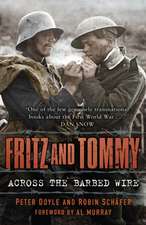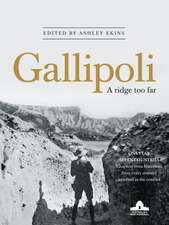Psychological Trauma and the Legacies of the First World War
Editat de Jason Crouthamel, Peter Leeseen Limba Engleză Hardback – 24 noi 2016
This transnational, interdisciplinary study of traumatic neurosis moves beyond the existing histories of medical theory, welfare, and symptomatology. The essays explore the personal traumas of soldiers and civilians in the wake of the First World War; they also discuss how memory and representations of trauma are transmitted between patients, doctors and families across generations. The book argues that so far the traumatic effects of the war have been substantially underestimated. Trauma was shaped by gender, politics, and personality. To uncover the varied forms of trauma ignored by medical and political authorities, this volume draws on diverse sources, such as family archives and narratives by children of traumatized men, documents from film and photography, memoirs by soldiers and civilians. This innovative study challenges us to re-examine our approach to the complex psychological effects of the First World War.
| Toate formatele și edițiile | Preț | Express |
|---|---|---|
| Paperback (1) | 726.85 lei 43-57 zile | |
| Springer International Publishing – 27 iun 2018 | 726.85 lei 43-57 zile | |
| Hardback (1) | 730.35 lei 43-57 zile | |
| Springer International Publishing – 24 noi 2016 | 730.35 lei 43-57 zile |
Preț: 730.35 lei
Preț vechi: 890.66 lei
-18% Nou
Puncte Express: 1096
Preț estimativ în valută:
139.75€ • 146.30$ • 115.64£
139.75€ • 146.30$ • 115.64£
Carte tipărită la comandă
Livrare economică 07-21 aprilie
Preluare comenzi: 021 569.72.76
Specificații
ISBN-13: 9783319334752
ISBN-10: 3319334751
Pagini: 320
Ilustrații: XV, 335 p. 12 illus., 2 illus. in color.
Dimensiuni: 148 x 210 x 26 mm
Greutate: 0.52 kg
Ediția:1st ed. 2016
Editura: Springer International Publishing
Colecția Palgrave Macmillan
Locul publicării:Cham, Switzerland
ISBN-10: 3319334751
Pagini: 320
Ilustrații: XV, 335 p. 12 illus., 2 illus. in color.
Dimensiuni: 148 x 210 x 26 mm
Greutate: 0.52 kg
Ediția:1st ed. 2016
Editura: Springer International Publishing
Colecția Palgrave Macmillan
Locul publicării:Cham, Switzerland
Cuprins
Introduction Jason Crouthamel (Grand Valley State University) and Peter Leese (University of Copenhagen).- Part I: Battles over Representations and Perceptions of Traumatized Men.- 1. Losing Face: trauma and maxillofacial injury in the First World War Fiona Reid (University of South Wales).- 2. Male Hysterics: Screening Silent Resistance -- Subtle Agency in European Cinematography of War Hysteria in the First World War Julia Barbara Köhne (Humboldt University, Berlin).- 3. “Always had a pronouncedly psychopathic predisposition”. The Significance of Social Class and Military Rank in the German Psychiatric Discourse on Officers’ Neuroses in the First World War Gundula Gahlen (Free University, Berlin).- Part II: Traumatized Civilians in the Wake of the Great War.- 4. Violence, Trauma, and Memory in Ireland: the Psychological Impact of War and Revolution on a Liminal Society, 1916-1923 Justin Dolan Stover (Idaho State University).- 5. Gender, Memory and the Great War: the Politics ofWar Victimhood in Interwar Germany Silke Fehlemann (Heinrich Heine University, Düsseldorf) and Nils Löffelbein (Goethe-Universität, Frankfurt am Main).- 6. Subjectivities in the aftermath: Children of Disabled Soldiers in Britain between the Wars Michael Roper (University of Essex).- 7. “Entrenched from Life”: The Impossible Reintegration of Traumatized French Veterans of the Great War Marie Derrien (Rhône-Alpes Laboratory of Historical Research in Lyon).- Part III: Traumatized Medical Cultures.- 8. Making Sense of War Neurosis in Yugoslavia Heike Karge (Regensburg University).- 9. „Everything ruined, which seemed most stable in the world...“ - The German Medical Profession, the First World War and the road to the „Third Reich“ Livia Prüll (University of Mainz).- 10. Medical Experiences with Violence and Starvation in Psychiatry: The First World War as a Catalyst for the National Socialist ‚Euthanasia‘ Program Philipp Rauh (University of Erlangen, Nuremberg).- Part IV: A Coda on Trauma.- 11. Toward a Global History of Trauma Mark S. Micale (University of Illinois, Urbana-Champaign).
Recenzii
“This volume is an important … addition to the myriad histories of trauma and opens new avenues for research about disabled veterans in modern societies. … Crouthamel and Leese have put forth an important collection. And though the field of trauma studies already has a vibrant historiography, it seems to have an equally rich future if this volume is any indication.” (Evan Sullivan, H-Net Reviews, h-net.org, March, 2021)
Notă biografică
Jason Crouthamel is an Associate Professor of history at Grand Valley State University, USA. He is the author of An Intimate History of the Front: Masculinity, Sexuality and German Soldiers in the First World War (2014) and The Great War and German Memory: Society, Politics and Psychological Trauma, 1914-1945 (2009). He is also the co-editor, with Peter Leese, of Traumatic Memories of World War Two and After (2016).
Peter Leese is Associate Professor of History at the University of Copenhagen, Denmark. His publications include Shell Shock: Traumatic Neurosis and the British Soldiers of the First World War (2002), Britain Since 1945: Aspects of Identity (2006). Together with Jason Crouthamel he is also the co-editor of Traumatic Memories of World War Two and After (2016).
Peter Leese is Associate Professor of History at the University of Copenhagen, Denmark. His publications include Shell Shock: Traumatic Neurosis and the British Soldiers of the First World War (2002), Britain Since 1945: Aspects of Identity (2006). Together with Jason Crouthamel he is also the co-editor of Traumatic Memories of World War Two and After (2016).
Textul de pe ultima copertă
This transnational, interdisciplinary study of traumatic neurosis moves beyond the existing histories of medical theory, welfare, and symptomatology. The essays explore the personal traumas of soldiers and civilians in the wake of the First World War; they also discuss how memory and representations of trauma are transmitted between patients, doctors and families across generations. The book argues that so far the traumatic effects of the war have been substantially underestimated. Trauma was shaped by gender, politics, and personality. To uncover the varied forms of trauma ignored by medical and political authorities, this volume draws on diverse sources, such as family archives and narratives by children of traumatized men, documents from film and photography, memoirs by soldiers and civilians. This innovative study challenges us to re-examine our approach to the complex psychological effects of the First World War.
Caracteristici
Provides a more diverse approach to the history of trauma in the Great War Includes contributions by historians, anthropologists, psychologists, and gender studies scholars Uses rich primary source material in multiple fields


